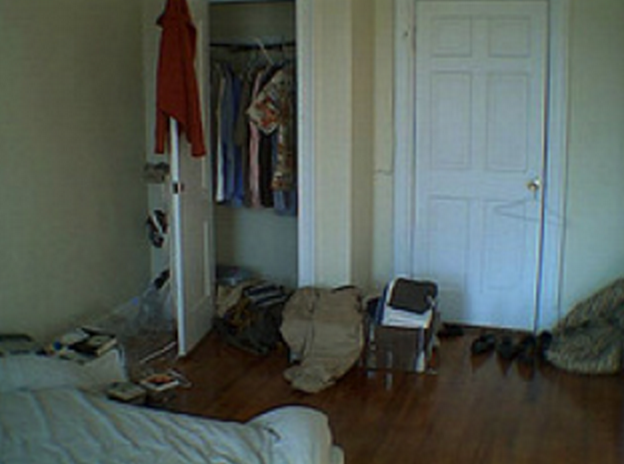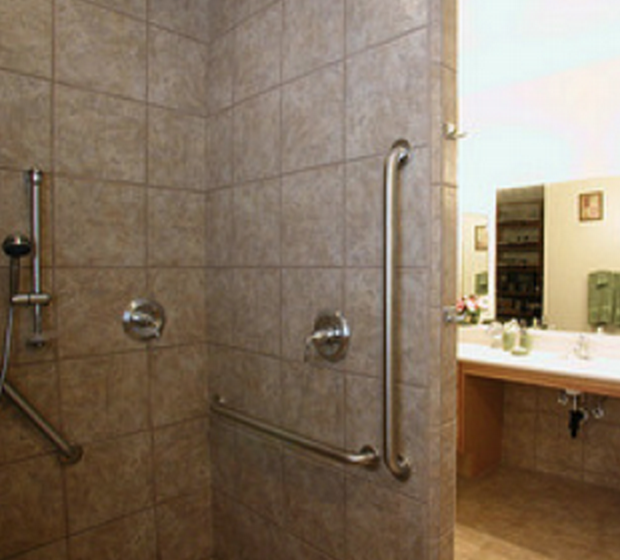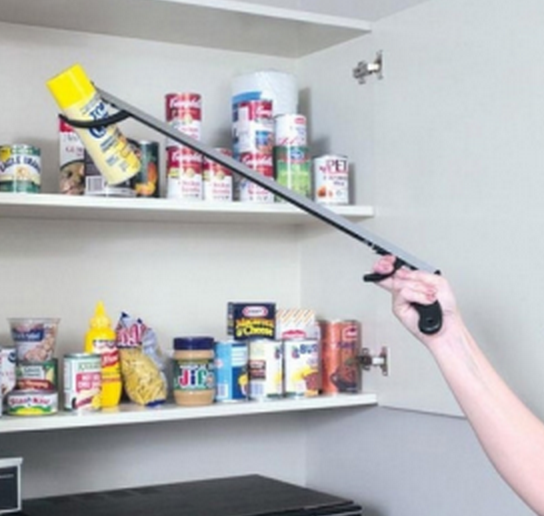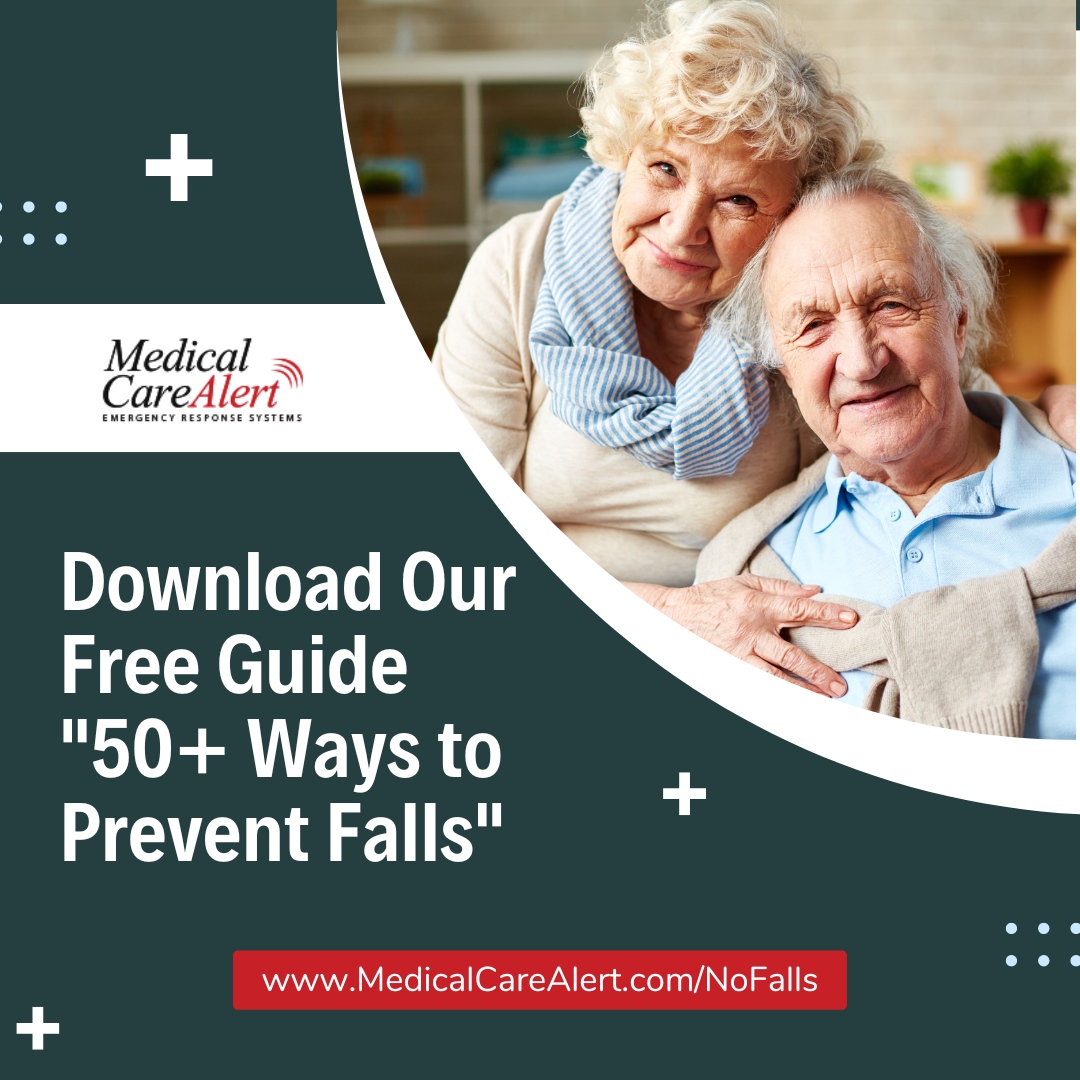Fall Prevention Guide
Medical Care Alert offers this free guide to educate and inform families on ways to prevent falls. We want you to share this guide to your heart's content. Please link or direct people to https://www.medicalcarealert.com/fall-prevention-guide/.
Download Our Free Guide
"50+ Ways to Prevent Falls"
Please print our fall prevention guide, and feel free to share it with your friends and family.
Introduction - Fall Prevention In The Home
Are you afraid of falling because you're not sure if you can get up again? Have you had friends fall and incur thousands in medical bills because of a momentary misstep? You're not alone, but you don't have to be afraid.
As people age, their bodies are more prone to degeneration and falling. Bones become more brittle and have a higher chance of breaking. And, with more and more people over the age of 65 deciding to live independently, there is more of a chance that these people will be falling alone.
In these pages, we provide safety tips for seniors, focused on preventing falls in the home. Making the home safe also makes it more enjoyable, for the senior, caregivers and visiting family members. Be sure to try these safety tips for elderly family members and make everyone safe at home!
How can we prevent falls among the elderly?
To answer, we've gathered some of the best fall-prevention tips together in a single book to help caretakers, clients, friends, and relatives of those who are likely to fall. These tips will help you fall-proof your home and make it much safer for everyone who comes over.As people age, their bodies are more prone to degeneration and falling. Bones become more brittle and have a higher chance of breaking. And, with more and more people over the age of 65 deciding to live independently, there is more of a chance that these people will be falling alone.
Let's look at some statistics:
The 3 Biggest Contributors to Falls

Most falls are not because someone trips over something. Instead, they are caused by some problem with the body or the mind. Medications, vision problems, and a weak body are the main contributors to falls. Here's what you need to know.
Medication interactions
Certain medication have side effects that can make it difficult to walk around. Drowsiness, dizziness, and nausea are just a few examples that can happen. These effects can cause a fall, especially if a new medication has been added into the mix.
Drug interactions can also cause these effects. This is one reason why your doctor always wants to know all medications and supplements you're taking. A drug interaction can cause side effects far worse than a single drug.
Talk with your doctor or pharmacist about any drugs you're taking, especially if you're adding a new one. Take it easy the first few days to see how your body reacts to the drugs. Medical interactions should be closely monitored, and if there is an obvious bad reaction, the doctor should be immediately contacted.
Diminished vision
Many people fall because they don't have the depth perception or clarity of vision to know where an object is in the first place. Check your vision every single year and make sure that any prescriptions for glasses or contacts are up to date.
Another reason that people fall is that they forget that they still have on their reading glasses. Reading glasses magnify what's in front of the reader, but they can cause problems when navigating.
Exercise levels
Muscle mass decreases over time and this causes people to become weak. All people need to exercise. It can be enough just to stay active by regularly checking on the garden, walking out to the mailbox, or making a concerted effort to walk around the house. It has to be regular. Exercise makes people more flexible, stronger, and have more balance. A strong body can help prevent falls or make them less serious.
The amount of exercise you need may be much less than you think. If you're exercise adverse, talk with your doctor to learn about how much you really need, and simple exercises you can do to keep your muscle mass and coordination.
Preventing Falls: Safety Tips for the Home and Yard

Following safety rules in the home is very important. Keeping things neat, clean, and tidy can prevent a lot of falls. Here are some things to think about if you have trouble getting around.
Bathroom Tips
Clean!
The more cleaning, the better. Soap scum can form on the inside of the tub, causing a slippery ring that can cause falls if not cleaned.
Clearly Label Hot and Cold Water Knobs
Bad burns are sometimes caused by the inability to see the labeling on the shower handles. Water can get into the eyes or a bout of forgetfulness may slip in. By clearly labeling the handles with a waterproof marker, you are preventing mishaps.
Kitchen Tips
Keep Everything in Reach
Place frequently used dishes and silverware within easy reach. When everything is close by it minimizes the need to stand on tiptoes or to bend over to get something.
Minimize Items in the Kitchen
If you're living alone, do you need 28 plates? Do you really need more glasses than an optometrist? Box them up and put them into storage or give them away.
Keep Cabinets Organized
If you don't know what's in them, or fear for your life when you open a cabinet, it's time to organize. Take everything out, decide what you need and don't need, putting the things that you don't need into storage boxes.
Safety Tips for Stairs
Limit Upstairs Use
If it is possible to arrange a house to avoid having to climb stairs, do so. A stair fall can easily cause severe injuries.
Check the Carpet
Make sure that there is no carpet that's sticking up or ruffled. If carpeting starts to become loose in a stairwell, tack it down or reinstall it completely.
Inspect Handrails Often
Loose handrails are of no use to you because you cannot trust them to hold your weight when you push on them. Inspect hand rails to make sure that they do not easily move in your hands and repair them as soon as you notice something loose.
Go Slow
It's not a race. Going a little slower on the stairs has the potential to save your life.
Repair Walkways
Even a little crack can cause a big problem. If you go out often, hire someone to repair any damage to walkways.
Keep Walkways Clean
If you're out in the sun, wear sunglasses to protect your eyes from the glare. Make sure that if you wear prescription eyewear that the sunglasses adhere to your prescription.
Use a Cane or Walker if necessary
If you need extra support while walking, the best thing to do is use a cane or a walker. An orthopedist can recommend the correct height.
Be Careful Going out to the Mailbox
When walking out to the mailbox, be very careful when changing heights. Even a small change in height can cause a fall.
Wear Sturdy Shoes
For added traction, make sure you wear rubber-soled shoes with good tread when going out. Our next section titled Choosing the Right Shoes goes over how to choose the right non-slip shoes.
General Fall Prevention Tips
Remove All Throw Rugs
Those throw rugs can catch on your toes and cause falls. If you're in the kitchen a lot, consider putting in textured linoleum or thin carpeting.
Clean Spills Immediately
"I'll get to it later". Unfortunately, those "later" things cause hazards for those who are walking around. Immediate cleaning means you don't have to pay attention to them anymore.
Keep Everything Closed
Murphy's Law says that if there's a possibility that you can bump into it, it will be bumped into. Closing cabinets, drawers, and doors when they're in the way takes only a second.
Brighten The Dark Corners
In larger houses, there are plenty of dark corners which can cause trouble. Setting up lights where you need them will not only brighten up the house, but brighten up your life.
Keep Clothes Organized
Store clothing, bed coverings, and other household items where you can comfortably reach them.
Get Help if you need it
If you find that something is heavier than you can lift, get assistance or reduce the load as much as you can.
Prevent Falls By Choosing the Right Shoes
Put Shoes Through the APMA Test
APMA's 1-2-3 test.
1. Press on both sides of the heel area to ensure the heel is stiff and won't collapse.
2. Bend the shoe to check for toe flexibility. The shoe shouldn't bend too much in the toe box area, but it shouldn't be too stiff and inflexible either.
3. Try twisting the shoe; it shouldn't twist in the middle.
Have Your Feet Professionally Measured When You Shop
Natural aging and health changes can cause the size of your feet to change. Measure both feet - late in the day - and shop for the larger foot.
Bring Your Socks!
Bring the type of socks you plan to wear most often with the shoes. That will ensure you purchase the right fit for your foot.
Choose Quality Over Price
Quality shoes can be an investment. Before you buy, check to see if the brand and style you're considering have earned the APMA's Seal of Acceptance and Seal of Approval. The organization grants these seals to products found to promote good foot health.
Choose Comfort Over Style
Shoes should feel comfortable and supportive right away. If they don't feel good right away, breaking them in won't improve things.
Avoid High Heels and Slick Soles
They do look great, but they do absolutely nothing to prevent falls. Look for shoes that have nonskid soles, as they are more likely to prevent falls.
Should You Get Shoelaces?
Remember as kids we were constantly told to tie our shoes? It can be difficult to tie knots with arthritic fingers. Untied shoelaces are a sure way to fall quickly. If you have trouble bending or tying, consider Velcro fasteners as an alternative.
See a Podiatrist
If you have specific health challenges or foot issues, talk to a podiatrist about the best footwear for your needs. If your podiatrist has prescribed orthotics - biomechanical inserts that go into your shoes - take them with you when you shop and try them out in the shoes you're considering. Having proper footwear is a key step (pun intended!) to helping to prevent falls among seniors.
Things You Can Install or Do in the Home to Prevent Falls

Once the physical issues and medication issues are examined, it's time to look at the home. There are a lot of things that can be done in each room of the house to help people stay safe. There may be special safety equipment you need to get, like a grab bar or a non-slip mat. You might also need to reorganize some things. Try these tips out.
Bathroom Items
A bath or shower can turn into an absolute nightmare with a fall. With slippery floors and plenty of uneven, hard surfaces, injury can happen very easily. The chances of falling are higher in the bathroom than nearly any other room in the house. A wide array of safety equipment has been made to make bathrooms safer. Here's a list of common changes and upgrades to ensure bathroom safety for seniors.
Install Suction Mats or Safety Strips for Traction.
Suction mats provide a bit more traction, lowering the risk of falling in the tub. They are attached by suction cups to the tub, which is where they got their name. Suction mats are available in a wide variety of sizes, shapes, and colors, so there should be something for even the most decorating-conscious. Safety strips in the middle of the tub are another way to give more grip. Be sure to follow the installation instructions carefully to prevent curling or slipping.
Use Night Lights
Installing a night light is one of the single-most valuable fall prevention activities that you can do in a home. Night lights prevent people from fumbling for their medication in the middle of the night. Bathroom safety for seniors is greatly enhanced with night lights.
Sit Comfortably in a Shower Chair
Shower chairs are excellent for those who are not able to stand up long enough to take a shower. The chairs provide an anchor to sit in and wash every part of their body.
Install a Detachable Shower Head
One of the best investments that you can make for fall prevention in the bathroom is to have a detachable shower head. By moving the head around rather than the body, there's less chance of a fall happening inside the shower. Combine this with a shower chair for extra safety.
Elevate Toilet Seats For Fall Protection
Toilet seats can prove to be an issue for those who do not have enough strength in their hips, knees, and legs to lift themselves. Installing an elevated seat will help your loved one stay in balance and therefore less prone to fall.
Put Non-Slip Floor Mats Down
The installation of non-slip floor mats is an excellent way to prevent falls in the shower or bath. These give an extra bit of help to people who might have otherwise been going from a wet surface to a wet surface. Non-slip mats are one of the easiest and least expensive ways to increase the bathroom safety for seniors.
Use an Organizer to Sort Soap and Shampoo
Organize toiletries in a way that they are very easy to reach and away from the floor. When bending down to pick up something, you can overextend yourself and reach over your center of gravity, increasing your likelihood of falling. Putting everything up at shoulder level prevents this from happening in the shower.
Keep Your Medical Alert Bracelet With You
The bathroom is the most common place for falls. Having a waterproof medical alert button specifically for the bathroom is an excellent investment. Be sure to keep the unit charged! An extra level of safety can be had with a fall alert system necklace pendant - also known as automatic fall detection. With our AutoFALL automatic fall detection system the button will initiate the call to our emergency response center when the sensors detect a fall. This type of alert system for seniors can be a real lifesaver!
Add Safety Bars
Safety grab bars are solid bars on the wall near the tub, shower, and toilet where people can grab and lift themselves up. Standard towel racks are not designed to hold your weight in a fall. Installing these bars in the bathroom can potentially save your life. When a grab bar is combined with a medical alert system, the consequences of falls are greatly reduced.
Change the Flooring
Linoleum and tile floors, while easy to clean, are incredibly slippery. Look into making an investment in a textured tile floor or even thin carpeting. That will let your toes grab onto the floor a little easier and provide a more stable surface for those who might have diabetic neuropathy.
Consider a Bidet
If you or your loved one is having difficulty safely cleaning themselves, consider getting a portable bidet. That will reduce the chances of rashes and infections, as well as generally promoting good hygiene.
Around the Home
The rest of the home also has safety risks that must be addressed. Take a look at these tips for ways you can make homes more fall-proof.
Get a Step Stool
It's better to stay safe with a step stool than overextend yourself by standing on tiptoes with a stick or other object. Make sure there is a grab bar on top of the step stool for support.
Use a Reacher

A reacher is a device used to pick up items from the floor or from a high place. They are invaluable for people with arthritis, but they can also help people who are prone to falling.
Reach for the Rails
For those who are prone to falling and have a second floor in their house, hand rails should be placed on both sides of the stairwell. The railings give you an anchor point from which to push off, just like the grab bars in the bathroom.
Install Non-Slip Pads on Stairs
Non-slip pads installed on stairs give you more surface grip. Wood stairs, for example, are sometimes especially slippery.
If Necessary, Install a Lift
Stair lifts (also called chair lifts) can be installed in homes for less than you think. They are classified as a home modification, and many insurance companies will pay for them. These devices mechanically lift people up the stairs. For more information about what can happen in an emergency with a fall, take a look at our article titled Actual Emergency Dispatch Transcripts.
Put Nightlights Everywhere
Install nightlights throughout the home to make night navigation significantly easier. Knowing the hazards within your home before they happen can prevent falls and other mishaps from happening. Inexpensive and highly effective.
Install Light Switches at the Top and Bottom of Stairs.
If you have stairs in the home, make sure there's a way to turn off the stairway light on both ends. That way there is no need to climb the stairs in the dark.
Place a Lamp and Telephone near the Bed
Nightstand tables are the perfect places to keep phones and lamps. You never know when you are going to need light to get around or just to jot down a number.
Use Furniture with Armrests
The best chairs for those with waning health are those which have solid armrests. These let you push yourself off with your arms, minimizing the strength needed from your legs.
What to Do In Case of a Fall
Regardless of the precautions that we take, falls can still happen. If you can get up under your own power, great. However, not all of us can do that, especially as we grow older. Unless someone has undergone surgery or something has dramatically changed, people do not become fall-prone overnight. It is a continuum. The weak become weaker over time.
The top priority after a fall is to assess the situation. Is there a need for medical personnel? Are you able to walk and talk on your own? Did you suffer a concussion, or are you hurt in any way?
A medical alert system can help in the event of a fall or other emergency. When you press the button, you are immediately put in touch with EMT certified professionals who can assess the situation and dispatch emergency personnel if needed.
After you have fallen, there is a window of opportunity to quickly recover from the situation. If medical personnel arrive within an hour of the fall, they can help to reduce the long-term effects of the fall or other emergency. If you are left alone, problems can be worsened.
A medical alert system makes the best choice to have in place BEFORE the fall. Nothing can take the place of preparedness.
New technology including automatic fall detection and GPS Location Services can also help to summon assistance in the event of a fall. While no automatic fall detection pendant can detect every fall with 100% accuracy, it can be a helpful additional layer of prevention and security.
When you have fallen, who do you call? Our medical alert systems help thousands of people across America achieve the peace of mind that they deserve. Learn more by calling us at 1-855-661-3384.
Be sure to read our free elderly fall prevention guide "50+ Ways To Prevent Falls" but you can also take these immediate steps to improve the safety of someone you love:
- Make an appointment with your doctor
o Medical Alert System with automatic fall detection - sensors detect falls and initiate a call to the emergency response center
We hope you enjoy our fall prevention guide and will be able to use these tips to prevent falls among the elderly family members you love. Find more information about our medical alert systems by calling 855-272-1010. Stay safe!



